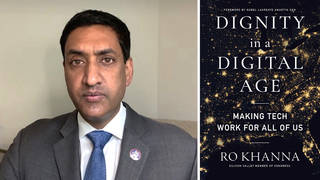
Topics
Guests
- Chuck Collinssenior scholar at the Institute for Policy Studies (IPS) and directs IPS’s Program on Inequality and the Common Good. He is co-author of the new study, “Executive Excess 2011: The Massive CEO Rewards for Tax Dodging.” He is co-founder of United for a Fair Economy.
A new study reveals that 25 of the nation’s largest corporations paid more money to their CEOs last year than they did to the federal government in income taxes. Often using overseas tax havens, many of the corporations managed to make billions in profits but paid little to nothing in federal taxes. In many cases the companies received large tax rebates. The list includes some of the country’s best-known companies, such as Ford, Coca-Cola, Verizon, General Electric and eBay. The same study found that the ratio of CEO pay to that of the average worker in the United States jumped to 325-to-1 last year. We speak to the study’s co-author, Chuck Collins, a senior scholar at the Institute for Policy Studies and director of its Program on Inequality and the Common Good. “What these companies do is they use a variety of tax loopholes, corporate loopholes, to game down their taxes. So, these are what I would call the sort of champion in the tax gymnastics department,” says Collins. [includes rush transcript]
Transcript
JUAN GONZALEZ: A new study has revealed that 25 of the nation’s largest corporations paid more money to their CEOs last year than they did to the federal government in income taxes. Often using overseas tax havens, many of the corporations managed to make billions in profits but paid little to nothing in federal taxes. In many cases, the companies received large tax rebates.
The list includes some of the nation’s best-known companies. At Stanley Black & Decker, the company paid its CEO John Lundgren over $32 million last year while receiving a $75 million tax refund from the federal government. At the car giant Ford, CEO Alan Mulally earned over $26 million, and the company received a $69 million refund. Coca-Cola’s CEO John Brock earned $19 million last year, $11 million more than the company paid in federal taxes.
AMY GOODMAN: And the list goes on. Verizon’s former CEO Ivan Seidbenberg took home $18 million in 2010, while the company received a $705 million tax refund. And General Electric CEO Jeff Immelt earned $15 million, while GE received a $3.25 billion tax refund. And at eBay, the company’s CEO, John Donahoe, earned $12 million, while the company got a $131 million refund.
The study looking at CEO pay and tax-dodging corporations was done by the Institute for Policy Studies. The same study found the ratio of CEO pay to that of the average worker in the United States jumped to 325-to-1 last year.
Chuck Collins joins us now in Boston, senior scholar at the Institute for Policy Studies. He directs IPS’s Program on Inequality and the Common Good.
We thank you so much for joining us. The name of your report is “Executive Excess 2011: The Massive CEO Rewards for Tax Dodging.” Chuck, welcome to Democracy Now! So, go through it with us. How exactly does this work?
CHUCK COLLINS: Well, good morning, Juan and Amy.
And essentially what these companies do is they use a variety of tax loopholes, corporate loopholes, to game down their taxes. So, these are what I would call the sort of champion in the tax gymnastics department. They are using the offshore system, using offshore tax havens to move their profits offshore and lower their tax bill to the United States.
And I think the thing that we found was surprising—we didn’t know this going into the study—was that we looked at the hundred highest-paid CEOs, and of those, 25, as you say, brought home more in their paycheck than they did pay in taxes. But we didn’t realize that those CEOs also got what I would call sort of the tax-dodging premium, meaning they were paid on average about $16 million, whereas average CEOs, the 500 biggest companies in America, were paid about $10 million. So they get like a 50 percent higher average pay, in part because they’re overseeing a company that’s aggressively avoiding taxes.
JUAN GONZALEZ: Now, Chuck, during the recent Verizon strike, I questioned the Verizon spokespeople repeatedly about their history, especially in the last few years, of paying no taxes. And they obviously dispute that. They keep referring to what they call “deferred taxes,” that there are—that the company maybe didn’t pay any taxes in this—in the last fiscal year, but they were—they had deferred taxes that they recognize that they will have to pay in the future for this year. Could you talk about that and how that factors into your analysis of these companies?
CHUCK COLLINS: Yes, Juan, and that’s a good question. And we’ve been quibbling with some of these companies. And they come back, and they’ll dispute our number of taxes paid, because they want to include in their tax—what they consider their taxes something called deferred taxes. But our point is, how long are you deferring these taxes? Some of these are companies that ship their profits offshore, claim—say that there’s a tax liability and that they’ll pay it when they repatriate their profits, when they bring it back to the United States. That could be never.
And there’s a very simple solution to this, and it’s very similar to like 10 years ago when we were trying to get the correct numbers on what these CEOs were paid, which is they actually could disclose what they pay in taxes, real taxes, what was the size of the check they wrote to the U.S. Treasury, and then they can also break out and explain, “We’re going to—these are deferred taxes,” and they can tell us, the public, when they’re going to pay those taxes. But we don’t think it makes sense to include a number—you and I don’t put in our tax form, “Oh, and by the way, we’re going to pay $100 in 20 years. We don’t count that in this year’s taxes.” So, it’s a very simple thing. We, the public, have an interest in knowing, especially in this tough fiscal time, knowing what these corporations are paying. And they should simply say what they pay. And as part of tax reform, we should require them, in plain language, to explain what they pay state, local, federal taxes, what they pay offshore in other countries, and what they’re actually—the size of the check that they’re writing to the Treasury. That’s what we want to know.
JUAN GONZALEZ: One of the other things that your report appears to point out is that the companies also paid more in lobbying expenses than they did in taxes, as well. Could you talk about that?
CHUCK COLLINS: Well, so 20 of the 25 companies also spent more on lobbying in one year, last year, than they paid in taxes. So, a company like General Electric spent almost $42 million influencing Congress. In exchange for that, they got about $3.2 billion in various refunds and subsidies. Boeing spent $20 million lobbying Congress. They got a $35 billion aircraft contract from the United States and only paid $13 million in taxes. So, as you can see, lobbying is a—these companies are investing in influencing the political system, rather than just—and using that, in part, to reduce their tax bill. So that’s part of the problem, is obviously the nexus of money and influence and how that affects taxes right now.
AMY GOODMAN: Chuck Collins, as we went through what the CEOs were getting and what the companies were not paying out in taxes, we mentioned Jeff Immelt, who earned $15 million while GE received a $3.25 billion tax refund. Jeff Immelt is the GEO CEO and—the GE CEO and also Obama’s job czar, isn’t he?
CHUCK COLLINS: That’s right. President Obama appointed him to oversee this Council on Competitiveness. And a number of the companies—Honeywell is another company that’s on our list, where the CEO is paid substantially more than the company pays in taxes. Supposedly, these companies are going to advise the President on how to create jobs in America, but it seems like they’re not the kind of companies that we should be putting a lot of stake in. I mean, one of the problems with this whole—this offshore or this tax-dodging system is it’s very unfair to domestic U.S. businesses and smaller businesses, which are the real job engines in this country. Small businesses create many, many more jobs than these large global companies. And yet, this sort of two-tier tax system puts them at a disadvantage. So, these global companies are gaming the system, and domestic businesses have to compete against them. So, I would rather see some other types of business leaders advising the President on how we’re really going to create a kind of a built-to-last company—country—companies and businesses, that will hire and retain, for the long term, U.S. workers.
JUAN GONZALEZ: And of course—
CHUCK COLLINS: Jeffrey Immelt is not really going to help with that.
JUAN GONZALEZ: One of the things that many of these big companies are pressing for now—they’re doing it quietly with these huge expenditures on lobbying—is to get Congress to pass a new amnesty for repatriating money from abroad, from all these tax havens where they’re keeping the money. What’s your sense of how that will fare and how important that is for the American public to keep its eye on?
CHUCK COLLINS: Well, right now it’s very important, because there is a deal being cut right now behind the scenes which would allow some of these companies to repatriate or bring back profits that they’ve parked offshore, to bring them back to the United States, but to lower—at substantially lower taxes. By the way, these are the—some of those—deferred profits that these companies claim to be calling taxes paid in years past.
So, just to explain it really simply, companies, and 18 of the 25 companies we looked at, are aggressive users of what I would call the offshore system, which is, they have subsidiaries in countries like the Cayman Islands or Luxembourg or Ireland. And they claim that those subsidiaries, they shift profits and earnings or—or those subsidiaries, like in the case of eBay, may be holding patents. Google, Apple, these are all countries—companies that use this offshore system to put their intellectual property offshore. So they claim that they’re earning profits in these offshore subsidiaries, and those profits are considered offshore and unrepatriated. Then every couple years what they do is they lobby Congress for a tax holiday, for special treatment—
JUAN GONZALEZ: An amnesty, right?
CHUCK COLLINS: —for bringing those profits back. So they did this in 2004, and they’re trying to do it again. And they would like to—instead of paying the 35 percent tax rate, they’re asking to pay a five percent tax rate.
So, we the people have to keep an eye and basically say no tax holiday for these tax cheats and tax dodgers. Let them, if they want to bring their money back, pay the taxes that other domestic companies are paying.
AMY GOODMAN: It’s interesting, Meg Whitman, who ran for governor of California, was the former head of eBay, right? The former CEO of eBay.
CHUCK COLLINS: That’s right, another person who claims to have advised presidential candidates and elected officials, and run for the Senate herself, on her job-creating record. Here’s an interesting thing. EBay, you know, if you go on eBay and you buy something, you use some interesting tools, online tools that they’ve created. The patents for those tools are held in offshore corporations. The money comes into eBay, they pay royalties to their subsidiaries, lo and behold, they’ve lowered their U.S. tax bill. So they say, “Hey, Uncle Sam, we didn’t earn as much last year. We’re not—in fact, we need a refund. We need to get back some of the money that we lost in the United States.” And meanwhile, they’re banking huge profits because of their subsidiaries are in Ireland or the Netherlands, and they’re paying low or no taxes on them. That’s not a—that’s not a built-to-last strategy for any successful company.
AMY GOODMAN: Chuck Collins, your study also found the salary gap between corporate executives and workers has exploded in recent years, rising from a ratio of 263-to-1 in 2009 to 325-to-1 last year. Talk about this.
CHUCK COLLINS: Yeah, we’ve been watching this trend now for 18 years. And just to kind of even put it in more historical context, in 1980, the ratio between highest-paid worker and average worker was about 42-to-1. So now we’re at 325-to-1, which is close to what it was in 2007 prior to the economic meltdown. But what we’ve seen over 20, 30 years is a steady, growing debt. Wages for most workers have stayed flat or stagnant or even fallen, and wages for top company officials have gone off on a rocket. So that’s the long-term trend.
AMY GOODMAN: And the findings come just weeks after Congress approved the bipartisan debt deal that excluded any tax hikes on the nation’s wealthiest individuals and corporations.
CHUCK COLLINS: Yeah, and this is—this is really the important context here. I mean, this wrenching deal and the fact that the super Congress is sitting down—this committee, is sitting down to identify one-and-a-half to two trillion dollars in budget cuts over the next 10 years, the fact that corporate taxation isn’t on the table is a problem. The fact that corporate tax dodging and raising taxes on millionaires isn’t on the table is a problem.
I mean, the good news is, the U.S. population is fully behind—polls show the public wants corporations to pay their fair share, they want to close these offshore tax havens, they want millionaires to pay at rates that they paid 10 years ago, as part of the solution to the budget problem. And, you know, it’s not going to get on the table unless the public really demands it. And this is why, you know, I think, as many of your listeners probably have heard these statistics over the years, and are perhaps a little cynical about it, but we actually—this is a moment where the population, as a whole, is outraged, is really angry that we’re about to go into deep budget cuts, cutting Pell grants and, you know, schools and teachers and firefighters, and yet we’re not even going to talk about corporate tax dodging and the billions of lost revenue from that. So this is an important time for people to get engaged and, you know, join groups like US Uncut or The Other 98%. These are groups that are getting into the streets this week at town hall meetings. They’re showing up and saying to their members of Congress, “Why is it that you’re not dealing with corporate tax dodgers? Why isn’t that part of the revenue solution that’s going to get the fiscal house in order?”
AMY GOODMAN: Finally, President Obama is going to be giving a rare—a speech before a rare session of a joint session of Congress next week. Now all the emphasis is how he and the Republicans have been fighting over when he can do this. He’s not going to be able to do it Wednesday night, because the Republicans are having a presidential debate, so he’ll do it next Thursday night. But, Chuck Collins, can you talk about what kind of speech you would like to see him give? What program should he lay out? What should happen?
CHUCK COLLINS: Well, he needs to be very clear. I won’t talk so much on the spending cut side, although I think there’s clearly—we could cut a third of the military budget by closing bases and obsolete weapon systems. We could eliminate farm subsidies that go to agribusiness. There’s lots of spending cuts that I would recommend.
But when it comes to the revenue question, he needs to basically become a champion of this. He needs to stand up and say, “Look, there’s no way that we can get our fiscal house in order if we don’t address the loss of revenue from taxation of millionaires and this corporate tax system.” And he should call on Congress to pass the Stop Tax Haven Abuse Act, which Senator Carl Levin has introduced, which Lloyd Doggett has introduced. That would generate a hundred billion dollars of revenue a year, from closing this offshore system. He, himself, was a co-sponsor of that act when he was a member of the Senate. President Obama gave a speech where he said, “Look, in the Cayman Islands, there’s a building called Ugland House that has 19,000 corporations in it.” He says, “It’s either the biggest building or the biggest tax scam that I’ve ever seen.” So President Obama actually understands how destructive this offshore system is. He needs to stand up and say, “As part of this, Congress should pass the Stop Tax Haven Abuse Act, create a level playing field with domestic businesses.” He should also call for the rollback of the Bush tax cuts and new top tax rates on millionaires. Right there, he’s got—there’s $2 trillion, over 10 years, of revenue. He has to be a champion of that. So I’d hope he’d use his speech to push back on the sort of “We can’t even talk about taxes” framework that has been set up around the super committee.
AMY GOODMAN: We have to wrap right now, but it’s also very significant that this hurricane that has whipped through the East Coast—the discussion now, as homes are drowned, as villages and cities are cut off, is will there be offsets, the kind of cuts—and Juan, you may have been following this—Congress is talking about, to help there be some kind of hurricane relief for people. But first, the discussion of who gets cut. And we don’t hear this issue of the corporate executives or corporations weighing in here, Chuck.
CHUCK COLLINS: No, I mean, we’re looking at a time of absurd unequal sacrifice. You know, I just came from Vermont, where they’ve just been walloped with the worst storm of the century. The fact that ordinary, middle-class taxpayers are going to be picking up the slack for tax cuts for the wealthy and corporations at a time—and then see further cuts that are going to undermine the quality of life in our communities, the only—you know, we just need to get engaged as a public. This fall, this week, you know, go to a town hall meeting. You know, at the usuncut.org website, there’s a list of all the town meetings this week. If your member of Congress is having a town meeting, this needs to be part of the discussion—
AMY GOODMAN: Chuck Collins, we want to thank you for being with us.
CHUCK COLLINS: —the unequal sacrifice. We’re a wealthy country.
AMY GOODMAN: Thank you so much.
CHUCK COLLINS: OK, thanks, Amy. Thanks, Juan.
AMY GOODMAN: Senior scholar at the Institute for Policy Studies, directs IPS’s Program on Inequality and the Common Good. He’s co-author of the report “Executive Excess 2011: The Massive CEO Rewards for Tax Dodging.”












Media Options